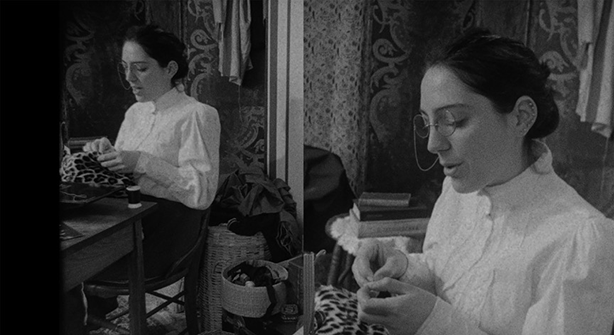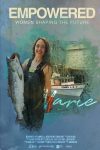Ann Arbor Film Festival: Ari Speaks with Acts and Intermissions Director Abigail Child

A still from Acts and Intermission, courtesy of Abigail Child
The 55th Annual Ann Arbor Film Festival, “the oldest avant-garde and experimental film festival in North America,” takes place March 21-26. Zingerman’s is a proud sponsor of the fest, and Ari is especially excited about one film in particular this year: Acts and Intermissions. The reason? The documentary is about Emma Goldman, an American anarchist and political activist whom Ari has written and spoken about extensively—her work has also been very influential to Ari’s ever-evolving business philosophy.
Ari recently interviewed Abigail Child, the director of Acts and Intermissions. You can read that conversation below, and don’t miss Child and Ari’s live Q&A after the showing of the film on Saturday, March 25 at 12:30 pm at the Michigan Theater. Tickets are still available.
Here’s a sneak peek:
Ari: Emma Goldman has had a huge influence on me, my work and my writing, over the years. I was excited to find someone else today who’s focused on her insights and inspiration. What prompted you to make a film about her?
Abigail Child: There’s an origin story but rather indirect. I had made a film fictionalizing archival home movies, material shot in Europe between the wars focused on two young sisters: The Future is Behind You. I was speculating on what the “characters” in these movies were doing and thinking and speaking behind/alongside the images. A kind of Jamesean speculative endeavor. Once edited, I realized that this was a wonderful narrative stratagem. Could I tell a story creating imaginary home movies? I then proposed such a film to tell the story of Mary and Percy Shelley. I was awarded a Rome prize for a year in Rome (2009-2010) and shot the film there. Mary and Percy had spent six of their eight years together in Italy so the location was perfect as was the architecture & atmosphere of the place. As I built this film, it became a critique of Romanticism, how ideology fails women. Mary lost four of her five children, ultimately Percy dying young, and Mary herself suffered societal critique in that she had run off with a married man at 16! They were bohemian royalty in a way. While I was editing, it came to me that I could do a trilogy that rewrote women at the center of history: Mary Shelley and 19th century romanticism, Emma Goldman and 20th century anarchism, and a, as yet unnamed, woman and 21st century Science.
Ari: While she’s certainly not a “secret,” Emma is hardly a household word in the US today. What impact are you hoping that the film will have?
AC: Not surprisingly, the more I researched, the more relevant Emma’s story became. I knew I did not want to stay in the past (as I had to a great extent with the Shelley story). I wanted to bring Emma’s issues, and protests into the present. This was not hard as our political landscape has duplicated the past: in terms of wage injustice, sexual and racial injustice, police brutality, protests and more recently, a repressive federal government. A simple example: I had not realized until my research, that the Espionage act that exiled Emma was used against Debs, Manning and Snowden 100 years later. Amazing!
What impact do I imagine for the film?— that the fight is not over. That we have had to fight for our freedoms in the past and once again. This seems important to me, particularly as a college professor, I saw students were more assumptive about their freedoms and dismissive of history (even among my peers!). Thus, less knowledgeable about politics and how hard earned are our freedoms.
Ari: Clearly Emma Goldman’s work has some particularly relevant messages for our current national situation. I’m guessing, though, you started this work long before the recent elections?
I started the work in 2014 but the issues above—relating to work, fair pay, and police brutality were/are completely familiar. As well of course, the issues of the right to one’s own body, sexuality and the desire to be “more than a mere woman”.
Ari: Emma in her day was considered one of, if not the, most dangerous minds in the country. What do you think made her so intimidating to people?
AC:I think she was most intimidating to the FBI! To her friends and often the audience, she was a small passionate woman to whom injustice was anathema. There are many comments to that effect in her autobiography: ie that people were surprised when they met her that she was small and plump and kind and in her private life, had quote unquote “feminine desires”——for flowers, ‘beautiful things’ and love.
Not to minimize the enormity of her ideas. She was a powerful speaker who could move people with her words. Her speeches give you some idea in that though somewhat dated, they remain moving. The only voice recording I found of her was not intimidating, but oddly comic: she had a weird English accent [learning English as her third language I suspect] and she spoke in sports terms: things like “I had my innings”.
Ari: Like all of your work, you’ve created something innovative – a blending of documentary footage, modern day recreations, captioning, etc. What do you like about this sort of mixing of media methodologies?
AC:Thank you. I’ve been thinking a lot about a kind of macro montage, a structure that is prismatic, a constellation, rather than all of one thing. It is an attempt on my part to take in the world, to not close out part of the world, to not be “pure” but rather impure, inclusive, “unbound” if you will.
Years ago I read and it could be apocryphal (likely is) that the psychiatrist R. D. Laing who created a psychiatric community project at Kingsley Hall in UK, where patients and therapists lived together, came to New York City and was overwhelmed. He turned around and went back. I was struck that someone who could live with/within mentally ill patients couldn’t “take” a metropolitan city. I wanted to be someone who didn’t need to retreat, didn’t need to go into nature or a monastic existence, but could find some kind of peace/understanding/non-peace in the midst of life/living. A rather idealistic wish for sure but one that has also governed some of my continuing aesthetic choices. Still a wish: to include everything in one’s art.
I know in a world of digressive sampling and instantaneous news and constant web surfing, that inclusion can result in overload, error, nonsense, superficiality, headache. I am trying to make sense of this world, discover how to explore, how to remain open and make sense/or make non-sense sensible….within parameters of cinematic discovery.
Ari: When one studies it in depth, anarchism turns out not to be a political program but rather a belief system about how to live our lives every day and how to present in the world in a positive way. what are some of the beliefs that Emma’s work inspired in you?
AC:Where I connect to Emma is in the sense that injustice cannot be tolerated. And that we ourselves need to trust ourselves, depend on ourselves and fight the normative ordinary world which wants to hold you down to custom/gender/ bad government etc. Also that “beautiful things” or love/art/books/music are part of the freedoms for which we fight. It is for food and shelter yes, but without the beauty of the world, life would be hollow.
Ari: What lessons or learnings would you hope that viewers will take away from the film? What do you take away yourself?
AC:That the fight for justice is not over, is unending. That we need examine work, policy, police and justice issues always. And that freedoms can never be assumed, but must be won again and again.
Ari: If I’m reading correctly this is the second film in this series? The first was about Percy Bysshe Shelley and Mary Wollstonecraft. Her father, William Godwin, of course, was also an anarchist. Are there more anarchists coming down the road?
AC:No, but more Golems! If the first film Unbound looked at 19th Century and Romanticism through the life of Mary Shelley and Acts looks at 20th century Anarchism and protests through the life of Emma Goldman, the last piece examines Science and the 21st century and will explore androids and machine-human relations.
I am interested in transformers, revolutionists, bohemians and those who find a life outside mainstream culture—but indeed the connections between these figures still surprises and enlightens me.
Ari: One of Emma Goldman’s great quotes for me was, “Anarchism is the spirit of youth against outworn tradition.” I haven’t seen the film yet so I don’t know if that’s in it …Thoughts?
AC: Definitely…the spirit of youth, of revolution, of idealism. I grew up in the crucible of the 60s—civil rights, anti-war protests, women’s rights, back to nature communities, rock and roll amidst repeated assaults and assassinations. It was that idealism and revolt indeed that attracted me to the Shelleys, and then to Emma.
Ari: Emma actually visited Ann Arbor six times to speak. A seventh visit was cancelled by the mayor just shy of a century ago, the year that she was being deported to Russia. What do you think she might say if she were here to give a talk in town today?
AC: She would be addressing the same issues from 100 years ago (sadly they are not solved/resolved): fair pay, women’s rights, the freedom for women to control their bodies (contraception; abortion), civil and religious rights whatever one’s origins. She would be speaking to the promise of America—the America that is seen worldwide—even strangely to those of us living here who know how hard and cruel this country can be—as a beacon of hope. She loved the land that exiled her, loved it even to the end. I think we all wish it to be the land of promise—that it is only intermittently and even feebly—but the promise that we hold in our heads and hearts is the light we reflect back on the nation.
Purchase tickets for Acts and Intermissions here. You can find Ari’s writings on Emma Goldman in his newest book Zingerman’s Guide to Good Leading, Part 4: A Lapsed Anarchist’s Approach to the Power of Beliefs in Business.




Zingerman’s Art for Sale